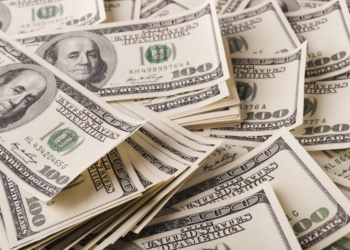I think a lot of people are finding themselves surprised, in the wake of the horrific murder of Charlie Kirk in Orem, Utah, on Wednesday, just how influential — and how loved — a figure Kirk really was.
I could back that contention with example after example of the tributes being paid to Kirk in the wake of his slaughter at the hands of an as-yet-unidentified (at least as of this writing) maniac. But instead I’ll just cite the most obvious — President Trump has indicated he’ll bestow the Presidential Medal of Freedom on the slain conservative activist, and Vice President Vance canceled an appearance at the 9/11 anniversary memorial in New York to fly to Utah to be with Kirk’s family and to accompany them home, with the casket, to the Phoenix area on Air Force Two.
If you weren’t paying attention to Kirk’s exploits, you wouldn’t have realized just how big a deal Charlie Kirk was.
But if you’re paying attention now, you’re starting to realize how big a deal Charlie Kirk is.
I only met him once, and it was little more than a handshake and a kind word. But what I drew from that short interaction was that he had an infectious positivity, a viral energy, and a deep conviction. Those traits were incandescently on display in the countless videos of him speaking and interacting with people of every background and point of view, videos which are more viral now than ever.
There is a meme floating around with Charlie’s face on Obi-Wan Kenobi, light saber in hand, with the caption, “Strike me down, and I will become more powerful than you can ever imagine.” Time will tell whether that’s true, but one thing that is unmistakable is that by murdering Charlie Kirk, the villains responsible have made him a martyr to several important causes. (RELATED: Charlie Kirk’s Assassination Is a Turning Point for the USA)
He’s now a martyr for an entire generation of young American men who have followed him through their high school and college years over the past decade.
He’s now a martyr for an entire generation of young American men who have followed him through their high school and college years over the past decade. Charlie Kirk dropped out of college to start Turning Point USA, which the Left likes to snark about, but what was crystal clear was that he was one of the best-educated people modern America has produced. Kirk’s command of facts, history, civics, and philosophy was virtually unmatched, and in someone so young — he was all of 31 years old when he was felled by that assassin’s bullet on Wednesday — the only word which seems to fit is to say that it was uncanny.
He’s a martyr for Christianity. No one in America did more to advance God’s word on college campuses over the past decade than Charlie did, and he did it not as a preacher but as a layman, whose faith permeated his lessons on culture, civics, and politics.
And he’s a martyr for masculinity. Charlie was unapologetic in his defense and promotion of traditional masculinity in front of a generation of young men who had been propagandized by academic and pop culture to the proposition that being a man, in the traditional sense, was toxic and immoral. Charlie exploded that lie time and again. The more they hated him for it, the more clearly he made the case.
Many have said that Charlie Kirk was very likely to have eventually become president had he not been assassinated.
Which perhaps more than anything else explains his assassination.
Immediately after the news of his having been shot surfaced, the Left began blaming Kirk for his own demise. The best example came from the odious Matthew Dowd, who, from his perch at MSNBC, ranted that Kirk got what he deserved on account of his “hateful” speech.
But those who knew and followed Charlie Kirk recognize that for the lie that it is. For Charlie Kirk was no hatemonger. Charlie Kirk was a man of God, if not of the cloth, and what his enemies call hatred, the rest of us recognize as truth.
Kirk never raised his voice in anger, though he spent a career full of moments where it would have been appropriate. He was given death threats, harassment, and the worst kinds of insults from the very beginning of his campus activism, and through it all, he remained calm, respectful, and unafraid.
Was he forceful? Of course he was. Truth-tellers are forceful because the truth has force.
And he was a truth-teller. He spoke truth to the feminists, the transgender mob, the race-baiters, the redistributionists, the climate-change alarmists, and countless others who would line up to debate him at events just like the one at which he was killed.
Charlie was never disrespectful in those debates. He spread love, and they called it hate. And he won, because those minds which were persuadable were, more often than not, persuaded.
He beat them. And they knew it. That’s why they killed him.
In that way, Charlie Kirk was very much akin to another slain thought leader of yore.
He never had that seminal moment on the Washington Mall like Dr. Martin Luther King Jr. did in 1963. Instead, Charlie had countless seminal moments and reached far more people in less time than King.
Charlie leaves behind a beautiful family and a beautiful movement. I can’t say who will lead Turning Point USA going forward, but what I can say is that by taking him out, they’ve created a vacuum that countless conservatives, inspired by him, will passionately seek to fill.
And if our leaders on the Right are wise in the wake of his murder, they’ll use this opportunity to honor him by setting his memory and movement in concrete.
Especially in the case of public universities in red states, where the power to force it through unquestionably exists, there should be statues of Charlie Kirk erected on each campus as a monument to free speech and those who insisted upon it. Doing so will no doubt inflame the Left, but that’s the point — why would it trigger you that a slain political activist who simply pitched a tent on campus to invite debate and an exchange of ideas be honored for that activity?
To oppose the memorialization of Charlie Kirk’s campaign for free speech and open debate on college campuses is to oppose those things he fought for. And if that perspective were to win the day, precisely what’s the purpose of those institutions and what claim do they have to our tax dollars?
Those are questions Charlie would ask.
He was a freedom fighter. He was a Christian missionary. He was an Abraham for conservatism to the younger generation.
Donald Trump wouldn’t be president but for the philosophical and ideological bombs Charlie set off on those college campuses.
We must honor that. We must honor Charlie. And we must ensure his immortality by continuing to fuel his movement.
READ MORE from Scott McKay:
Did Decarlos Brown End the Civil Rights Era in America?
Baseball Karen and the End of Western Society
Peter Navarro, Lawfare, and the Death of Executive Privilege




![Gavin Newsom Threatens to 'Punch These Sons of B*thces in the Mouth' [WATCH]](https://www.right2024.com/wp-content/uploads/2025/08/Gavin-Newsom-Threatens-to-Punch-These-Sons-of-Bthces-in-350x250.jpg)
![ICE Arrests Illegal Alien Influencer During Her Livestream in Los Angeles: ‘You Bet We Did’ [WATCH]](https://www.right2024.com/wp-content/uploads/2025/08/ICE-Arrests-Illegal-Alien-Influencer-During-Her-Livestream-in-Los-350x250.jpg)








